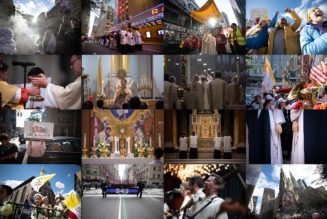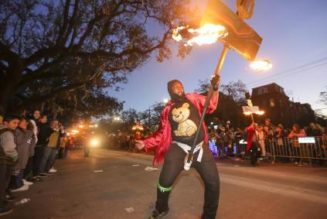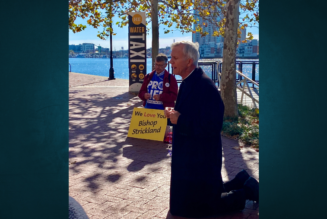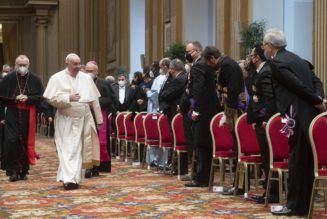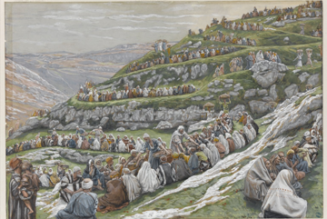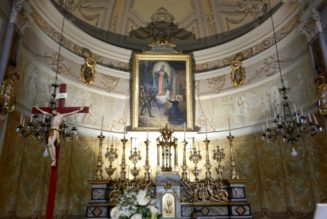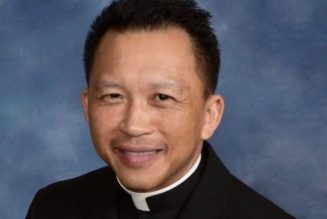Happy Friday friends,
And a very happy feast of the Sacred Heart of Jesus to you all.
Unless you’re a Dodgers fan — you should reflect on your life choices today. Consider switching to the Angels, they have two obvious first ballot hall of famers on the team and are barely staying above .500. For an ’80s Cubs fan like me, that’s basically the golden ratio.
I’m not going to go on about that particular event scheduled in LA, I’m just going to note that today is, and has been for a lot longer than there has been baseball, a deeply beautiful feast — the history of which we have a great explainer on here.
The bishops have called for all Catholics to pray a Litany of the Sacred Heart today in reparation for the anti-Catholic mockery being honored at Dodgers Stadium. I will be, and I hope you will too.
Meanwhile, this newsletter is coming to you from sunny Orlando, where JD and I are currently sitting at the back of a conference hall for the USCCB’s spring assembly.
This is not a part of the country with which I have had much experience. Truth to tell, it wasn’t until my plane was coming in to land that I realized this isn’t a seaside town at all. It’s all been a bit otherworldly since then.
The resort hotel where the conference is meeting is definitely a different flavor to what I’m used to, and the aesthetic, if not cognitive, dissonance of the bishops meeting next to (albeit not in open view of) an 850-foot lazy river was jarring at first. Though, perhaps inspired by the opening address of the apostolic nuncio, Archbishop Pierre, I have begun to reconcile the two as time wears on.
The nuncio, as he seems to do any time he finds room with three or more people in it, delivered an address on synodality yesterday, more on which later.
But the more I listened to the archbishop speak, the more I began to think of the lazy river as a potentially synodal experience. It is, after all, a place where one encounters others, often spontaneously, in a fluid and unguarded context.
Also like the synodal process (at least as it was explained to the bishops on Thursday morning), the lazy river can be an uncomfortable experience for those (like me) who come to it with what some like to call a preference for “rigid modalities.”
And like the synodal process, the journey itself, taken together, along the lazy river is really its own purpose, not the arrival at some predetermined destination — indeed, fully entered into, communion is fostered in the slow and meandering flow, even when you’re actually only going in circles.
And, like a synodal address, the lazy river is perhaps best approached and appreciated after several drinks.
At least so I would imagine. Just thinking about them left me needing one, anyway.
The News
The Society of Jesus announced this week that Marko Rupnik, the priest, religious artist, and serial sexual abuser, has been dismissed from the society.
Reporting the news, many outlets noted that while Rupnik has been expelled from the Jesuits, the Society of Jesus did not say he had been laicized — meaning, they said, that he “remains a priest.”
Theologically speaking, everyone ordained a priest always remains a priest no matter what, since ordination imparts an indelible character. But it’s also true in this case that Rupnik also remains a cleric, despite his dismissal as an SJ, though that’s not to say he becomes a kind of wandering priest, unanswerable to anyone.
Canon law actually provides for situations like his that he enters into a kind of permanent/indefinite suspension from ministry unless and until he can find a bishop willing to incardinate him, or another religious order willing to take him.
You can read the whole story here.
—
The public sessions of the USCCB assembly kicked off with the customary addresses from the apostolic nuncio and the conference president.
The nuncio made the point that the revival is essentially a complimentary event to the synodal process, and that both should be seen as means by which the Church fortifies itself for more effective evangelization.
Broglio, for his part, noted that the synodal process had been a point of sincere encounter and dialogue for the Church in the United States and that even if the final document produced for the North American bishops “reveals some lacunae in the ecclesiology and the preparation of the faithful. That, too, can be a grace, if we help to fill some of those gaps.”
You can read our coverage of the day here.
—
We caught up with Archbishop Broglio later in the day and gave him a kind of quick-fire round of questions on a few different issues in the Church right now.
He talked about the Eucharistic Revival, the synod, and a couple of other issues.
Given that earlier this week the conference had put out a very strongly word statement condemning the decision by the LA Dodgers to honor the so-called “Sisters of Perpetual Indulgence,” we asked him about that, too.:
“The question in my mind always is: What is more effective? Do you give more attention to the event by protesting it, or do you do better by ignoring it? That would be the question I would ask.
I would land more towards ignoring it.”
We also asked him about the kinds of Catholic counter-protests that have sprung up around today’s event, which organizers have likened to the March for Life.
Here’s what he told us:
“I think there is a lot of risk there. Also the thing that would concern me would be the danger of violence. The March for Life is very well organized, and it’s very respectful, but there’s also several decades of experience there. These kinds of things, that are more organized on the q.t., are a little harder to control, and that would be my concern.”
You can read the whole interview here.
—
St. Francis Memorial Hospital, identified in a recent report as performing transgender surgeries, is not actually a Catholic hospital, the Archdiocese of San Francisco clarified this week.
The report lists some four dozen hospitals and medical clinics that are affiliated with CommonSpirit Health through mergers with other health systems.
St. Francis Memorial Hospital in San Francisco was included on the list as reportedly offering transgender surgeries and therapies, and performing surgical sterilizations. But Peter Marlow, executive director of communications for the Archdiocese of San Francisco, clarified that St. Francis – which was founded in 1905 by a group of local doctors – is not a Catholic hospital, despite its name.
But, he said, CommonSpirit is aligned with a different system that includes the non-Catholic hospitals that were in the former Dignity Hospital system, through a series of mergers over the years.
While there are certain carve-outs in the relationship for some of the non-Catholic hospitals to perform sterilizations, they have agreed to abide by other guidelines contained within the U.S. bishops’ Ethical and Religious Directives for Catholic Health Care Services (ERDs) – they do not perform abortions, physician-assisted suicide, or in vitro fertilization.
But transgender surgeries are a relatively new issue, Marlow continued, and were not originally included in the ERDs, which are currently in their sixth edition.
As it happens, the bishops are scheduled to vote this morning on whether to begin the process of updating the ERDs.
So stay tuned on that, and you can read the report here.
—
As the bishops are meeting here in Orlando, they do so with the looming fifth anniversary of the Archdiocese of New York announcing a credible allegation of child abuse against then-Cardinal Theodore McCarrick.
As JD notes, despite McCarrick’s reputation for gift-giving and financial largesse, and his cultivation of a deep and wide network of friends and proteges throughout the Church, “no living contemporaries of the former cardinal have faced consequences for the prospect of having looked the other way.”
“No churchmen who served in secretarial, vicarious, or auxiliary roles to the former cardinal have been examined for the prospect of their complicity in McCarrick’s misdeeds, or even their possible enabling thereof.”
And there remains little appetite in many U.S. chanceries to offer a full or frank accounting of McCarrick’s time leading them — even when the current bishops have promised the opposite.
That’s worth remembering.
You can read JD’s whole analysis here. I recommend that you do.
A very personal synod
In his address opening the public sessions of this week’s USCCB assembly, Archbishop Christophe Pierre elected to talk to the bishops about synodality. Again.
I don’t blame him for taking the chance to drive home his message, of course. What the synodal process is, what it’s meant to achieve, and how successful it can really be said to be at this point are all open questions — as the nuncio himself acknowledged.
What struck me was his suggestion to the bishops that maybe if they were just a little more on board with the will of the Holy Father, they’d find these questions answered themselves — or perhaps they’d just cease to worry about them.
As I said in an analysis this week, I think there are real risks to framing the synodal process as a kind of prophetic charism rooted in the pope personally. For one thing, setting up enthusiasm for the synodal process — which has achieved very different results in different places — as a kind litmus of test, not just of loyalty to the pope but of faith in the Holy Spirit, seems likely to exclude the kind of frank exchange of experience and ideas that Francis is calling for.
Synods are, after all, consultative processes meant to inform and assist the authority who calls them as they make up their mind. Suggesting, as I think Pierre more than did yesterday, that to be a bit hesitant about the synod is to be somehow against the vision of the pope and the will of the Paraclete doesn’t leave a lot of room for honest feedback.
To be clear: I think the synodal process is a bold experiment in ecclesiology. It is, as Pierre put it, “a new way of being Church.” While I would like the name of the nunciature staffer who taught the archbishop that especially dated and obnoxious idiom, he is not wrong that the pope has called on all the faithful of the world to give this a try and we owe him our sincere participation as much as our real impressions of it.
But the nuncio seems to be arguing for something more than that, suggesting a unique and uniquely Francis vision for remaking the Church which must, as a matter of divine will, be judged a success before the fact.
I’m not sure that’s helpful, either to the pope or to the synodal project.
I think, for example, there’s a lot of good to be learned from the synodal experience in many parts of Africa, but even those most committed to Francis’ vision would agree the German version has become a clear and present danger to the Church’s global communion.
And pegging the synod to Francis personally seems shortsighted to me. The pope has already extended the process by a year, and the simple reality is he’s an 86-year-old man just coming off a reasonably serious hospital stay. It’s not morbid to consider that it might be a different pope who concludes the synodal sessions in 2024, or writes an exhortation in 2025.
But if, as Pierre’s words seem to suggest, there is only one acceptable synodal outcome, and only one pope charged with bringing to life a vision prompted by the Holy Spirit, then we’ve tied the synod to the pope’s lifetime and erected something very like a legitimacy test for Francis’ successor.
Pierre is, I should note, far from the first person to speak of the synod, the pope, and the Holy Spirit in these terms.
But, it seems to me, the logic of the rhetoric is to limit the synod’s future potential, and to rule out the kind of flexibility, engagement, and active discernment which Francis has said should be at the heart of the Church’s life and mission.
LIV and let live
Lots of people I know are very angry this week about the announced merger between the Professional Golfers’ Association Tour and LIV Golf, the rival tournament owned and backed by the sovereign wealth fund of the Saudi government/royal family (there’s no real difference).
For those of you unfamiliar with the announcement, I cannot blame you, but the reasons for the rage are various and, to me, a little amusing.
Members of Congress are angry and demanding hearings, of course, while making noise about antitrust laws. That’s par for the course. But I have heard from a lot of friends who are personally enraged at the way in which the PGA has behaved.
By way of background: when LIV launched, it signed up a bunch of big-name golfers from the PGA Tour, paying them the GDP of a medium-sized state to play in and promote their tournament.
The PGA fired back by saying it would ban everyone who crossed over to LIV, and trotted out some of its loyalist members to denounce the rival tournament, the Saudi government, and the actions of their turncoat colleagues, as sinister and beneath the game of golf.
Some people consider it shameful for the PGA to have now made their most loyal players look ridiculous by turning around and selling out to the Saudis, lock, stock, and barrel, just months later. Mostly, though, they think it unjust that some big-name players were denied a chance to stand in front of a fire hose of oil money and get soaked.
My heart just bleeds for them. Thoughts and prayers, guys.
Seriously though, there are two issues here which I think merit discussion:
On the narrow issue of the LIV-PGA merger, I find it slightly hysterical that people think this is somehow an outrageous betrayal by the custodians of a game forged on the velvet greens of the world’s most exclusive private clubs.
This is the sport of green jackets, gold Rolexes, and goofy plaid pants, run by the sort of guys who talk openly about putting fried chicken on the clubhouse menu when a Black man beats them. Taking a ton of money from one of the world’s most repressive and repugnant royal families seems right up their street, if you ask me.
As for the players who shirked the Saudi shekel at the PGA’s insistence, they’ve got cause to be annoyed, I guess. But I can’t say I care, and I can’t understand why others are mad on their behalf. This is golf we’re talking about, after all.
There aren’t local teams to cheer for. It’s not as if families pass on generational loyalties to one or other guy named “Chipper.” These are, essentially, lone guns out to make their bucks playing a game. Good luck to them, sure. But let’s not pretend they’re local blue-collar heroes, wearing the town colors and getting stiffed by the man for their just wages.
The broader issue with the PGA-LIV deal is the wider trend of the Saudi sovereign wealth fund buying up premier sports teams and brands across Western countries. This is often said to be a bid to detoxify their national brand, known as “sportswashing,” after spates of bad press following things like, you know, the murder, dismemberment, and disappearance of the journalist Jamal Khashoggi.
In recent years, we’ve seen marquee sports franchises and premier tournaments taken over by the Saudi royals and there is, I grant you, a significant “ick factor” at play here.
But the reality is that Western governments have long since made their peace with the Arabian kingdom, in all its oppressive brutality — sure, they cut off the hands and heads of their people, but they do help stabilize the price of oil.
I’m not saying I think this is a good or ethical rationale; I’m just saying there’s little reason to expect the governors of our sports to hold themselves to a higher standard than our actual governments.
Other people tell me that the Saudi royals are acutely aware that their personal/national wealth is derived from a natural resource that is both running out and falling out of fashion and demand, and they are looking to diversify their wealth as a hedge against the wells running dry one day.
If that’s the case, I think it’s remarkably silly of them to invest so much in sports. You can own a league, a team, a tournament — but its value is essentially linked to popular buy-in. You can’t own a game. And (clearly) there’s nothing to stop the best players from just hitching themselves to the next big cash cow when it ambles along.
In the meantime, the Saudis can have Skippy, Flip, Thurston Wellington III, and all the rest. I just hope they don’t buy the Cubs.
See you next week,
Ed. Condon
Editor
The Pillar
Comments 23
Services Marketplace – Listings, Bookings & Reviews




